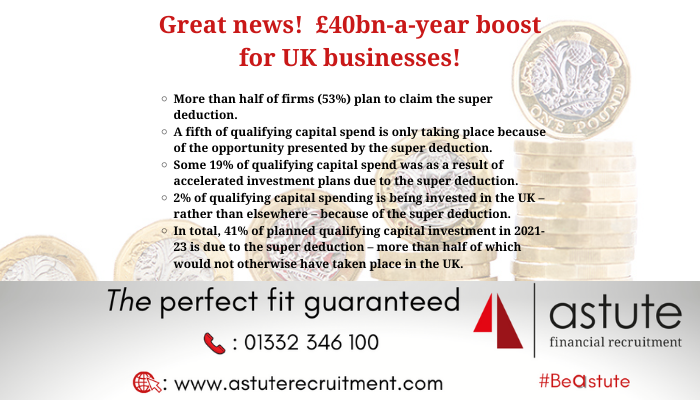
In exciting news, the Government’s introduction of their new permanent investment deduction – replacing their former ‘super deduction’ scheme has been hailed by UK businesses according to a survey by the CBI. The accountants have had their calculators out and the new scheme is reckoned to be able to boost UK business by as much as £40Bn every year in just 4 years time!
The good news!
325 companies, from SMEs to larger corporate companies in all sectors – from IT to manufacturing to pharmaceuticals took part in the CBI’s survey.
The results indicate that that the super deduction scheme has increased business investments and that the new permanent scheme could yield a 17% year on year annual increase in capital spending by UK businesses!
This dramatic increase could ignite growth forecasts for the SME business community and provide significant boosts to productivity and improved living standards right across the UK’s regions.
Results from the CBI’s survey indicate that over 50% of businesses either took advantage of the scheme or were planning to do so with the aim of turbo-charging their capital investment plans.
Now for the ‘BUT’…
As it stands the scheme is due to end in 2023, leaving a genuine risk that business investment could dramatically decline just when it is needed most! The OBR projects business growth plateauing to a modest 1.3% -1.7%.
The Bank of England themselves are predicting a decline in UK business growth to just 1% in 2024 and the CBI’s own forecast for business investment is expected to fall Q1 of 2023 when the ‘super deduction finishes.
The CBI’s plan to bring things back on track!
The Government are being urged by the CBI to create a permanent 100% tax deduction for capital spending in the year of expenditure at this year’s Spring Statement.
WHY?
The CBI say the new scheme would help to maintain business confidence and therefore investment throughout next year AND and enable an exciting 17% rise in business investment over the medium-term.
Without a successor to the super deduction, the CBI predicts the UK will have the lowest business investment of the G7 by 2026.
Implementing a permanent investment deduction would lift us off the bottom, fuelling higher growth and productivity across the UK. Longer term, increasing productivity is the only sustainable way to pay down debt and meet rising spending pressures.
Tony Danker, CBI Director-General, Tony Danker, had this to say: –
“The Chancellor’s super deduction exemplified the boldness in public policy that we need to inspire investment and get the economy moving. Going by our survey results, it looks to be a real success. It’s started the job but cannot be a one-hit wonder. Evolving the policy from short-term fix into long-term strategy will give firms confidence that Government and industry are aligned.
“The UK is facing the highest tax burden in decades. But by rewarding firms who put money into their operations, we can unleash new innovation and productivity – the ingredients we need to escape the low-growth trap and build a stronger, sustainable and more equitable economic future.”
WHAT THE CBI SURVEY REVEALED: –
Impacts of the Super Deduction:
- More than half of firms (53%) plan to claim the super deduction.
- A fifth of qualifying capital spend is only taking place because of the opportunity presented by the super deduction.
- Some 19% of qualifying capital spend was as a result of accelerated investment plans due to the super deduction.
- And 2% of qualifying capital spending is being invested in the UK – rather than elsewhere – because of the super deduction.
- In total, 41% of planned qualifying capital investment in 2021-23 is due to the super deduction – more than half of which would not otherwise have taken place in the UK.
The CBI’s survey revealed the following projected plus points if a new, permanent equivalent relief scheme were launched: –
- 50% of respondents indicated they would revise investment plans as a result.
- 24% said they would make additional capital investments in the UK.
- 13% would make additional investments – and bring forward investment timescales.
- A further 13% would accelerate UK investments already planned.
- Survey respondents revealed plans for £1.3billion of capital projects and said a new investment deduction of the type proposed would see £169million of that spending accelerated – and a further £224million of projects added.
- Extrapolating these findings to a medium-term projection of business investment shows this could increase spending by 17% by 2026, compared to existing projections.
- This is equivalent to additional investment worth £40billion per year by 2026.
- Expanding the assets that qualify for a permanent investment incentive – to include, for example, second-hand, leased and rented assets – and expanding the relief to unincorporated businesses could raise investment further, with potential for an additional boost of 4% over current projections, or another £10billion of investment per year by 2026.
Extracted from an article on the CBI’s website which you can view HERE.









